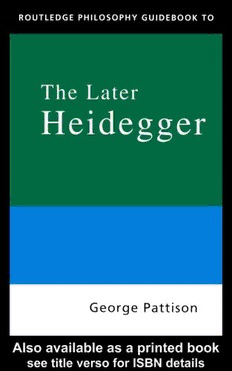
Later Heidegger Routledge Philosophy Guidebook PDF
Preview Later Heidegger Routledge Philosophy Guidebook
Routledge Philosophy GuideBook to The Later Heidegger ‘A highly instructive and engaging guide through Heidegger’s later writings, written in a lucid and accessible manner.’ Keith Ansell Pearson, University of Warwick ‘... a lively, clear and engaging overview of the key ideas in Heidegger’s later writings.’ Charles Guignon, University of Vermont This Routledge Philosophy GuideBook guides the reader through the complexities of Heidegger’s later works. The book offers a clear introduction to the main themes that preoccupied Heidegger in the second part of his career: technology, art, the history of philosophy and the exploration of a new post- technological way of thinking. George Pattison explores many aspects of the later Heidegger, including the massive controversy surrounding his Nazism, as well as his readings of Nietzsche, the Presocratics and Hölderlin. Pattison also carefully investigates the difficult question of the nature of Heidegger’s thought, together with its significance for philosophy today. The Later Heidegger is essential reading for all students coming to Heidegger’s later works for the first time. George Pattison is Dean of King’s College, Cambridge. Routledge Philosophy GuideBooks Edited by Tim Crane and Jonathan Wolff University College London The Later Heidegger George Pattison Hegel on History Joseph McCarney Hume on Morality James Baillie Kant and the Critique of Pure Reason Sebastian Gardner Mill on Liberty Jonathan Riley Mill on Utilitarianism Roger Crisp Wittgenstein and the Philosophical Investigations Marie McGinn Plato and the Republic Nickolas Pappas Locke on Government D.A. Lloyd Thomas Locke on Human Understanding E.J. Lowe Spinoza and the Ethics Genevieve Lloyd LONDON AND NEW YORK R Routledge Philosophy GuideBook to O The Later Heidegger U T L E D G E (cid:1)(cid:2)George Pattison First published 2000 by Routledge 11 New Fetter Lane, London EC4P 4EE Simultaneously published in the USA and Canada by Routledge 29 West 35th Street, New York, NY 10001 Routledge is an imprint of the Taylor & Francis Group This edition published in the Taylor & Francis e-Library, 2001. © 2000 George Pattison All rights reserved. No part of this book may be reprinted or reproduced or utilised in any form or by any electronic, mechanical, or other means, now known or hereafter invented, including photocopying and recording, or in any information storage or retrieval system, without permission in writing from the publishers. British Library Cataloguing in Publication Data A catalogue record for this book is available from the British Library Library of Congress Cataloging in Publication Data Pattison, George, 1950– Routledge Philosophy GuideBook to The Later Heidegger / George Pattison. (Routledge Philosophy GuideBooks) 1. Heidegger, Martin, 1889–1976. I.Title: Later Heidegger. II.Title. III. Series. B3279.H49 P39 2000 193–dc21 00-020572 ISBN 0–415–20196–9 (hbk) ISBN 0–415–20197–7 (pbk) ISBN 0-203-13127-4 Master e-book ISBN ISBN 0-203-17964-1 (Glassbook Format) Who laud and magnify with made, mutable and beg- garly elements the unmade immutable beginnings and precessions of fair-height, with halting sequences and unresolved rhythms, searchingly, with what’s to hand, under the inconstant lights that hover world-flats, that bright by fit and start the tangle of world-wood, rift- ing the dark drifts for the wanderers that wind the world-meander, who seek hidden grammar to give back anathema its first benignity. Gathering all things in, twining each bruised stem to the swaying trellis of the dance, the dance about the sawn lode-stake on the hill where the hidden still- ness is at the core of struggle ... (From David Jones, The Sleeping Lord and Other Fragments) C Contents o n t Foreword ix Acknowledgments xi e Abbreviations xiii 1 Is there a later Heidegger? 1 n 2 1933 and after 25 3 Technology 47 t 4 Seeing things 75 s 5 Nietzsche 105 6 The first and second beginnings of philosophy 129 7 Hölderlin 159 8 What kind of thinker? 187 Notes 217 Bibliography 223 Index 227 vii Foreword The text that follows explains itself, I hope. However, there is one point I should comment on. Different English renderings of Heidegger adopt different strategies with regard to capitalising the English ‘Being’ as a translation of Heidegger’s German ‘Sein’. The advantage of giving the lower-case ‘being’ is that it brings out the verbal aspect of the term and avoids misreading it as a hypostatised metaphysical concept. On the other hand, this could on occasion lead to it being read simply as a present participle and not as a distinctive philosophical term. In any case, the German word is a nominalisation of the infinitive, not the present participle ‘seiend’ (the nominal form of which, ‘Seiendes’, is usually translated ‘beings’ or ‘entities’). Where I have quoted English translations that follow a different practice, I have, of course, kept to their usage. Some measure of interpretation is unavoidable here, both on my part and on that of the reader. Perhaps, in the light of Heidegger’s own comments on philosophy and translation, the best we can do is to remember to hear the German ‘Sein’ in the English ‘Being’. ix
